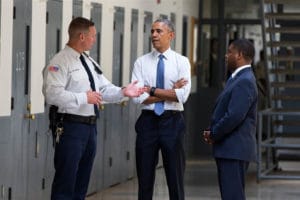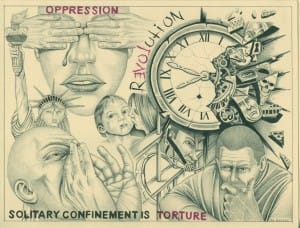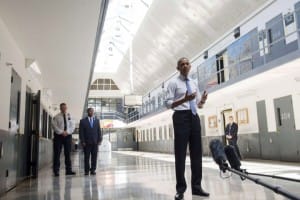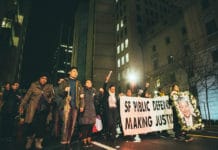by Dorsey Nunn, Legal Services for Prisoners with Children and All of Us or None
On Tuesday, July 14, one day after commuting the sentences of 46 people currently serving sentences for nonviolent drug offenses in federal prisons, President Obama addressed the NAACP National Convention in Philadelphia. In his address, the president declared that our criminal justice system is “built on the legacy of slavery, segregation and other structural inequalities that [have] compounded over generations.” Our current system, the president said, is “not an accident.”
The president declared that our criminal justice system is “built on the legacy of slavery, segregation and other structural inequalities that [have] compounded over generations.” Our current system, the president said, is “not an accident.”
As part of his solution to begin to address fixes to our system, the president asked the country to invest in linking prisoners with prospective employers, to “Ban the Box” on job applications so that people have a decent shot at a job interview.
We applaud the president for supporting Ban the Box, a campaign initiated by All of Us or None, and are hopeful that this public message is a sign that the president will support his views with action. Since All of Us Or None launched the campaign to Ban the Box over a decade ago, over one third of the nation – 14 states and over 100 cities and counties – have passed fair chance hiring policies, intended to protect people with arrest and conviction records from discrimination on initial job applications.
We have steadily gained traction nationwide, and in May of this year, Congresswoman Barbara Lee sent a letter urging the president to adopt a federal fair chance hiring policy that would prohibit federal contractors from inquiring about an applicant’s criminal record history on initial applications. All of Us or None has called on the president to sign an executive order that would require all private contractors to similarly “ban the box.”
The president asked the country to invest in linking prisoners with prospective employers, to “Ban the Box” on job applications so that people have a decent shot at a job interview.
President Obama commuted sentences for 90 people – a fraction of the 2.3 million people behind bars in our country, and yet more than any other president since Lyndon Johnson. By issuing an executive order to Ban the Box, he would provide hundreds of thousands of people the “decent shot” he says they deserve. This would be an opportunity for the president to lead the country towards a more just criminal system.

The president also commented on the use of solitary confinement in prisons across the country, and said that these practices are more likely to make inmates more hostile and violent, that this practice “is not going to make us safer, not stronger,” imploring us to remember that the vast majority of people who serve time in prison will be released. As he finished his remarks, the president called on the American tradition of remaking ourselves, the Christian traditions that “all of us need redemption,” and that “none of us is without sin” that “justice and redemption go hand in hand.”
We are heartened by the president’s message of justice for all, including for those who endure and are injured by solitary confinement – spending 23 hours in an 8-foot-by-10-foot cell every day across our country. Legal Services for Prisoners with Children has been litigating a suit against the state of California alleging the prolonged use of solitary confinement in Pelican Bay State Prison is a violation of the Eighth Amendment.
The next, crucial step President Obama must take to decrease the prison population is to commit his values to action by following the lead of human rights organizations across the globe and identifying solitary confinement as a form of torture, then prohibiting its use in prisons and jails in our country.
We are heartened by the president’s message of justice for all, including for those who endure and are injured by solitary confinement.
The president urged Congress to act, to get “smart on crime” by moving away from blanket reliance on mandatory minimums for nonviolent offenses to investing in crime prevention tactics that target juveniles and adults. On this end, the president offered concrete solutions such as job readiness programs, as well as a more abstract plea for empathy – that all children should be seen as important by their parents, neighbors, law enforcement and country.
The first, crucial step the president must take to end mass incarceration is to himself embody this empathy and to rethink his statement that “there are a lot of folks who belong in prison” and that our neighborhoods are safer thanks to police officers who put “violent criminals” in jail. This is a radical suggestion for a country so torn apart by racism, when the vast majority of those folks “who belong in prison” – those children and adults the president initially urged us to love and to see as important – are African-American and Latino.
But we will not escape the shadow of mass incarceration until we remember, as a country, that the legacies of slavery, segregation and other structural inequalities are endured by all people – those who commit crimes, both serious and non-serious, and those who punish those crimes. Fixing a criminal justice system built on these legacies requires us to dismantle all of that system – not just the parts that seem most politically feasible at the moment.
President Obama’s words and actions are a promising start. Let us all continue to push him further.
President Obama’s words and actions are a promising start. Let us all continue to push him further.
Dorsey Nunn, who was himself formerly incarcerated, is executive director of Legal Services for Prisoners with Children and a founder of All of Us or None, an activist organization for formerly incarcerated people. He can be reached at dorsey@prisonerswithchildren.org or at LSPC, 1540 Market St., Suite 490, San Francisco, CA 94102, 415-255-7036.
Dear Mr. President: Now is the time to stop solitary
by Rev. Laura Markle Downton, National Religious Campaign Against Torture
This is a week of firsts: the first time a president visited a federal prison while in office and the first time President Obama publicly addressed the horror of solitary confinement in U.S. prisons. Addressing the NAACP National Convention, he asked, “Do we really think it makes sense to lock so many people alone in tiny cells for 23 hours a day, for months, sometimes for years at a time?”
The president has instructed the attorney general to begin a review of the use of solitary nationwide. We must work together to ensure that words and review translate into action and change.

Please join us in urging the president to take action to end the torture of solitary confinement.
With his comments, President Obama echoed what people of faith across the country have advocated for years: that solitary confinement is an affront to our deepest moral convictions and must be brought to an end. This moment is the result of the work of so many communities of faith, survivors of solitary, prisoner hunger strikers and their loved ones who have tirelessly called for an end to torture.
Now we must call on the president to move from words to action. Join us in amplifying our message to the president that now is the time to end the torture of solitary confinement.
Send a message to the president, using NRCAT’s model email.
Submit a letter-to-the-editor (LTE) responding to articles in your local paper covering President Obama’s speech to the NAACP convention or his visit to the Federal Correctional Institution El Reno. NRCAT has prepared guidelines for your writing.
The president has instructed the attorney general to begin a review of the use of solitary nationwide. We must work together to ensure that words and review translate into action and change.
In advance of the president’s visit to El Reno federal prison in Oklahoma, the National Religious Campaign Against Torture delivered a letter to President Obama urging him to visit a solitary confinement unit, emphasizing that in order to see the reality of our prisons, he must bear witness to the torture of solitary confinement. News coverage has included:
- Rights groups push Obama to act swiftly on criminal justice reforms, Washington Times
- President Obama should visit solitary confinement cell to see true suffering, Religions News Service
- Obama, in Criminal Justice Speech, Denounces the ‘Overuse of Solitary Confinement” in U.S. Prisons, Solitary Watch
On this week of firsts, may we recommit to ending the torture of solitary confinement. Thank you for joining us in calling President Obama to act.
Rev. Laura Markle Downton, director of U.S. Prisons Policy and Program for the National Religious Campaign Against Torture, can be reached at ldownton@nrcat.org.
Statement by formerly incarcerated criminal justice reform advocate Glenn E. Martin on President Barack Obama’s historic visit to a federal prison
by Glenn E. Martin, JustLeadershipUSA
President Obama’s historic visit to a federal prison is a decisive step towards closing the social distance between those who author our criminal justice policies and those impacted by them. So many of our correctional woes stem from the utter refusal of policymakers to take full measure of the diverse experiences and expertise of those most familiar with the system; those who have served time.

The president’s visit serves a clarion call at a moment of widespread, but blinkered, consensus on the urgency of criminal justice reform. That is, our reliance on incarceration isn’t only a threat to fiscal stability, but to human lives. Silence on this point has been deafening, but the president’s commitment to shedding light on the realities of prison life says, perhaps, more than words ever could.
Indeed, the administration’s efforts on criminal justice reform extend well beyond symbolic gestures. By acknowledging the senseless brutality of the War on Drugs, the president further confirms that punishment has too often served as a stand-in for justice and rehabilitation. It’s become apparent that we’ve forfeited something of our values in the process.
And yet as calls for reform echo throughout the federal system, it’s important to remember that the majority of our incarcerated population languishes at the state level, where only 16% are there for drug-related convictions. Moreover, roughly 12 million people are cycled through our nation’s jails annually, often imposing tremendous social and economic costs for even brief stays. It will take an equal, and perhaps even more forceful, degree of courage on the part of state lawmakers to address mass incarceration in these often forgotten institutions.
President Obama’s historic visit to a federal prison is a decisive step towards closing the social distance between those who author our criminal justice policies and those impacted by them.
My solemn hope is that the president’s unprecedented efforts on criminal justice reform will herald a more robust and earnest commitment throughout all the nation’s corridors of power.
Glenn E. Martin wrote an open letter to President Barack Obama on his treatment during a recent visit to the White House. Click here to read the letter.
Glenn E. Martin is the founder and president of JustLeadershipUSA (JLUSA), an organization dedicated to cutting the U.S. correctional population in half by 2030. JLUSA empowers people most affected by incarceration to drive policy reform. Prior to founding JLUSA, Glenn spent six years in New York State prisons, served for seven years as vice president of development and public affairs at The Fortune Society, a respected reentry organization, and six years as co-director of the National HIRE Network at the Legal Action Center. He can be reached via https://www.justleadershipusa.org/contact/.
President’s prison visit shows ‘fierce urgency of now’ for criminal justice reform, Congress must act
Speaker Boehner announces his support of bipartisan legislation Congressman Cohen has cosponsored, the SAFE Justice Act
Washington, D.C. – With President Obama capping off a week of bringing fairness to our criminal justice system by becoming the first-ever sitting president to visit a federal prison, House Judiciary Subcommittee on the Constitution and Civil Justice Ranking Member Steve Cohen, D-Tenn., urged congressional leadership to act swiftly to support the president’s call to action and pass a comprehensive criminal justice reform bill that would be a boon for justice in America and save taxpayer dollars.
“With each instance of excessive police force – disproportionately against people of color – and every life sentence handed down for non-violent drug crimes, the urgent need for a top-to-bottom overhaul of our criminal justice system crystallizes a little bit more,” said Congressman Cohen. “President Obama has taken encouraging and significant steps this week to make things better and he is now highlighting the ‘fierce urgency of now’ that Dr. King spoke of half a century ago.”

In addition to serving as a member of the Over-Criminalization Task Force and authoring several bills meant to alleviate problems in our policing, sentencing and drug policies, the congressman is also a cosponsor of the SAFE Justice Act, legislation quickly gaining bipartisan momentum – including a reported endorsement by Speaker Boehner today – that is aimed at safely and comprehensively reining in the size and associated costs of the federal criminal code and prison system.
Congressman Cohen continued: “The president is right that our justice system should recognize the difference between dangerous criminals who deserve long sentences and young people who have simply made mistakes in their youth, but he cannot change the laws that ignore that fact by himself. Congress must act to bring real change, fairness and justice to how we police our communities and sentence convicts in a way that keeps citizens safe while saving taxpayer money.”
House Judiciary Subcommittee on the Constitution and Civil Justice Ranking Member Steve Cohen, D-Tenn., urged congressional leadership to act swiftly to support the president’s call to action and pass a comprehensive criminal justice reform bill that would be a boon for justice in America and save taxpayer dollars.
The SAFE Justice Act, introduced by Over-Criminalization Task Force Co-Chairs Jim Sensenbrenner, R-Wis., and Bobby Scott, D-Va., takes a broad-based approach to improving the federal sentencing and corrections system, from front-end sentencing reform to back-end release policies. It is also the first bill that addresses the federal supervision system – ensuring that probation does a better job stopping the revolving door at federal prisons.
The legislation, which is inspired by the successes of states across the country, will reduce recidivism, concentrate prison space on violent and career criminals, increase the use of evidence-based alternatives to incarceration, curtail over-criminalization, reduce crime and save money. Additional information about the legislation is available here.
“Whether it’s the SAFE Justice Act with Congressmen Sensenbrenner, the CARERS Act with Sen. Rand Paul or any other smart policy idea, my door is always open and I welcome the opportunity to work with Democrats and Republicans to solve these tough problems. For our physical and fiscal safety, Congress has to act,” said Congressman Cohen.
Cohen is the lead Democratic House sponsor of the bipartisan CARERS Act, which is being led in the Senate by Sens. Rand Paul, R-Ky., Cory Booker, D-N.J., and Kirsten Gillibrand, D-N.Y., to let states set their own medical marijuana policies, recognize a legitimate medical use for marijuana at the federal level, allow Veterans Affairs (VA) doctors to recommend safe and effective marijuana-related treatments and increase access to a non-psychoactive treatment that could help save lives.
And just last week, the House approved legislation authored by Congressman Cohen aimed at cutting short the “school-to-prison pipeline” that disproportionately affects African-American communities.
Congressman Cohen also introduced legislation in May with Congressman Lacy Clay, D-Mo., whose district includes Ferguson, Missouri, to help encourage incidents of deadly force used by police to be investigated and, if need be, prosecuted, by an independent entity as well as provide improved training for police officers. It currently has 36 cosponsors in the House.
“America received a sobering wakeup call last year in Ferguson, followed by others in Staten Island, Cleveland, North Charleston and more recently in Baltimore,” said Congressman Cohen when introducing the legislation. “The need for reform is as clear as it is urgent. Officers need better training. Excessive force must end. Justice shouldn’t just depend on whether a bystander catches bad acts on video.
“Expecting local prosecutors to prosecute the same officers upon whom they rely to do their job presents a clear conflict of interest, and it is unnecessary. Congress must act, and I am proud to join with my friend, Congressman Lacy Clay, to bring fairness to our criminal justice system.”
Tennessee Democrat Steve Cohen, serving his third term in the U.S. House of Representatives, can be reached via Twitter at @RepCohen.

 Store
Store











